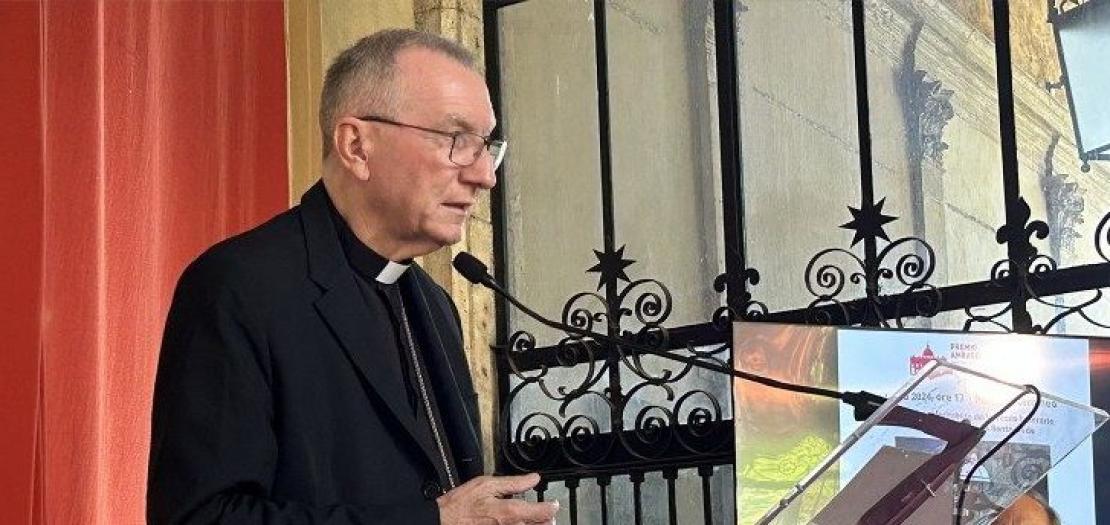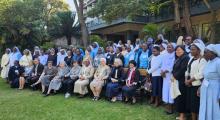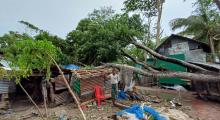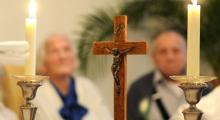Issued by the Catholic Center for Studies and Media - Jordan. Editor-in-chief Fr. Rif'at Bader - موقع أبونا abouna.org

Cardinal Secretary of State Pietro Parolin speaking at the the award ceremony of the Ambassadors' Literary Prize in Rome
Even if sometimes diplomatic efforts seem to produce small results, “we must never get tired or give in to the temptation of resignation”, Cardinal Pietro Parolin said on Tuesday, July 2.
“Peace is the duty of everyone” and begins “in our our daily lives, in our cities, in our countries, in the world”, he remarked. The Vatican Secretary of State was speaking at the Italian Embassy to the Holy See in Rome on the occasion of the award ceremony of the Ambassadors' Literary Prize.
The award, established in 2019 at the initiative of a group of Heads of Mission accredited to the Holy See, is addressed to authors of Italian-written books intended for the general public on topics relating to culture and Christian values, the relations between Christian Churches and States, the history of the Churches and interreligious dialogue.
Pacem in Terris is a testament
This year the recognition was awarded to the book “Può la Chiesa fermare la guerra? Un’inchiesta a sessant’anni dalla Pacem in Terris” (“Can the Church stop the war? An investigation sixty years after Pacem in terris”) by Italian RAI journalist Piero Damosso.
The volume reflects on Pope St. John XXIII’s second Encyclical Letter on peace in the world and, through the proposals and analysis contained in over fifty interviews, tries to find an answer to the fundamental question raised in the title: “Can the Church stop war and how?”
In his remarks during the ceremony, Cardinal Parolin recalled the genesis and historical context in which this landmark papal document was born which "built on scores of other pronouncements", he said.
Cardinal Parolin reiterated that universal peace is a good that concerns everyon, also recalling the historic radio message, on Holy Saturday 13 April 1963, in which Pope John XXIII stressed the need for peace with God, with all peoples, in families.
That Encyclical, the Secretary of State remarked, "is a testament”: “Those very intense words of Roncalli are a heritage to be safeguarded and cultivated, each taking on their own responsibilities. "
Cardinal Parolin, therefore, stressed the need to insist on diplomatic efforts in the face the current conflicts in various parts of world, in the certainty that they will bear fruit. He called for a choral effort and cooperation to truly be artisans of peace as Pope Francis urges.
Fraternity is the true way to justice
The Secretary of State praised the Damosso’s book ”for bringing to the fore the profound desire for peace with an interesting method", by making several witnesses and academics speak. What emerges, he said, is an all-round analysis on peace.
His words echoed those of the award’s jury that noted the journalist’s thorough investigation shows that “Despite not having the real power to stop conflicts, the Church, can call on the universal human conscience to act so as to break down the walls of hatred and enmity, indicating fraternity as the true way to justice, solidarity, inclusion and care of the Earth.”
The jury further remarked that “the Author also highlights how the power of prayer of God's people can encourage projects of encounter and negotiation".
The concept of ‘just war’ needs to be reviewed
Before the ceremony Cardinal Parolin spoke with some journalists. Asked about the conflicts in Ukraine and the Middle East, emphasized that war is never a just war. Commenting on the Holy Land Commission for Justice and Peace statement on this issue, he stated: "We know that there is a lot of discussion today on the concept of just war as a war of defense. However, with the weapons that available today this concept has become very difficult, and I believe that there is not a definitive position, but that this concept is under review".
Lebanon urgently needs a new president
The Secretary of State also commented on his recent visit to Lebanon. Asked about the possible solutions he envisages for the Lebanese crisis, he remarked that the priority at the moment is the election of the new President of the Republic: “The most important thing is having a president, closing this institutional crisis which is damaging the whole country", he said.
He also expressed his hope that Chrsitians may play an active role within the Lebanese system. "(The election) certainly won't be the magic solution, but we will begin to address the problems when all the institutional rolesare filled," he stated.
Cardinal Parolin confirmed that Maronite Cardinal Mar Bechara Boutros Al-Rai is an active actor in this context, "He has always tried to unite Christians and it seems that there is a willingness on the part of the Christian parties to unite, to propose one or more commonly accepted candidates".
Asked if there is dialogue with the Shiite community, Cardinal Parolin implied that dialogue is not lacking, but the problem is above all on the side of Hezbollah: "They are stake-holders in the game and have their candidate. The question is finding a candidate that it is accepted by all parties", he said.
Release of prisoners could help peace process in Ukraine
Cardinal Parolin also spoke about Ukraine, and was asked about the proposal presented by the Hungarian Prime Minister Orbán to Ukrainian President Zelenskiy, in his capacity as rotating president of the European Union, for an immediate ceasefire to facilitate a peace negotiation. "As far as I know, until now the Ukrainians have always refused", said the Vatican Secretary of State. He recalled hat for the Ukrainian government if there are no guarantees "this could only be a pause to then start again in an even cruder, harsher way.”
However, Cardinal Parolin, reiterated the Holy See’s hope that there “can be a truce, and then a negotiation".
Regarding the exchange of prisoners for which the Holy See has successfully mediated, Cardinal said that he foresees other releases "because - he explained - it is a mechanism that works which is distinct from that of children, where there are various realities involved. In the case of prisoners it is essentially an exchange of lists that are delivered to the two parties, so I imagine that this activity will continue a little which I believe is very positive and which can create conditions that could also favor peace and possible negotiations", he said.
We need values to preserve democracy
Finally, in his conversation with the reporters, Cardinal touched on the 50th Italian Social Weeks in Trieste, which kicked off on Tuesday and will see the participation of Pope Francis on July 7.
In this regard the Secretary of State remarked that the theme chosen for this edition focused on democracy is particularly relevant at this time "because - he noted - democracy is facing a crisis in many parts of the world and I believe that it is also very important for Catholics to reiterate the importance and need to be in favor of democracy and above all to fill it with values."
"Democracy - he noted - is not a simple mathematical exercise, who has more and who has less, but is above all an exercise of values, it is about drawing inspiration the values that make social coexistence possible. Therefore, I believe that the contribution that Catholics can make is very valid, I hope that something good comes from these social weeks,” Cardinal Parolin concluded.







